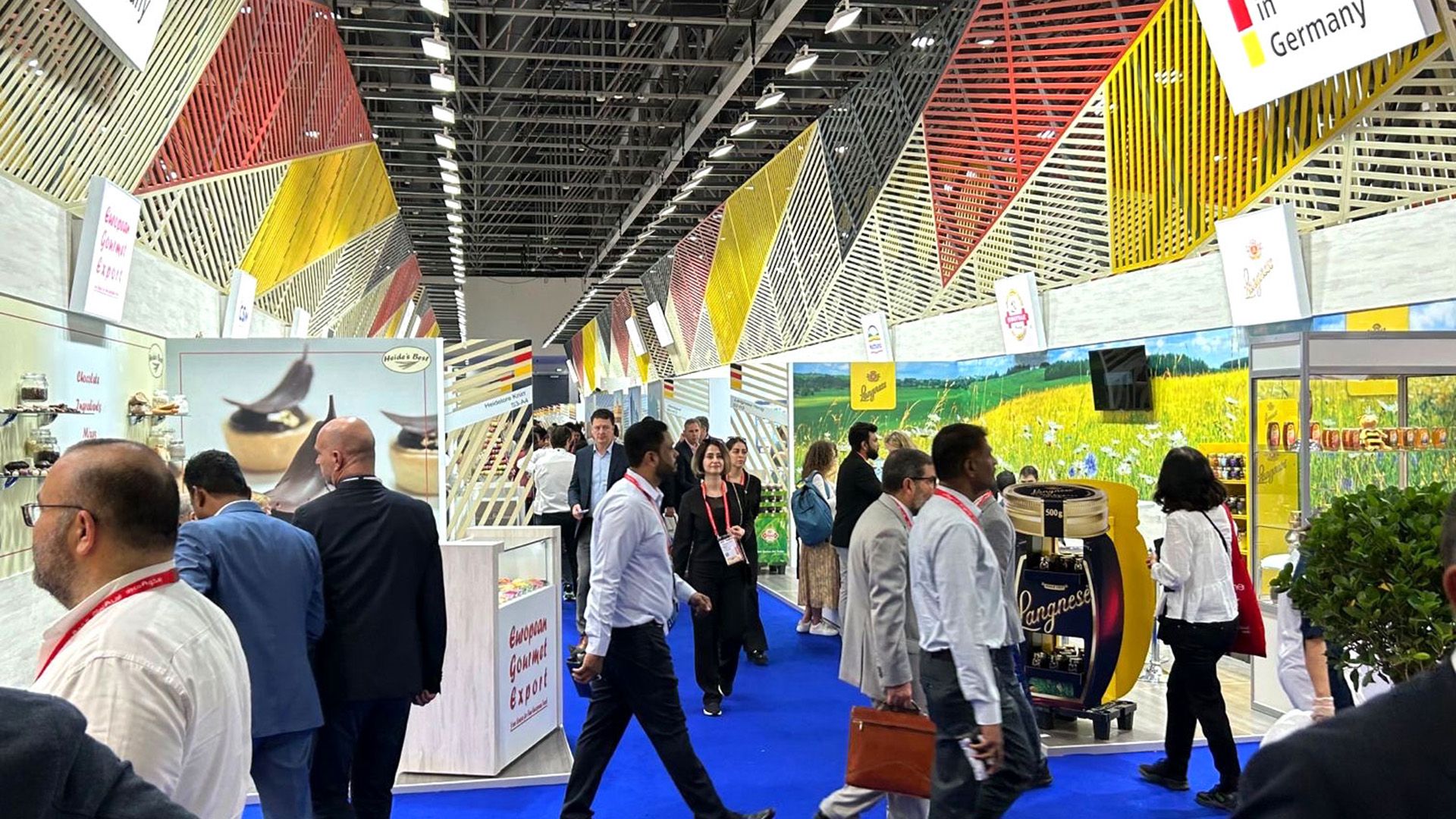
Export business
Open-mindedness as a guarantee of success
Every year, up to 5,000 exhibiting companies take part in the joint stands under the umbrella brand "Made in Germany". Photo: Auma
Every year, up to 5,000 exhibiting companies take part in the joint stands under the umbrella brand "Made in Germany". Photo: Auma
The oldest, most successful and most efficient support for small and medium-sized German companies on an expansion course is celebrating its anniversary: The International Trade Fair Programme - AMP for short - has been in existence for 75 years in 2024.
1949: The first Rose Monday parade since the end of the war passes through Cologne again, the Fraunhofer Society for the Promotion of Applied Research is founded in Munich, the obligation to licence printed publications is lifted in the western occupation zones - and the political course is set: The North Atlantic Treaty Organisation (NATO) is founded in Washington, ten European countries establish the Council of Europe, Bonn becomes the provisional capital of Germany: on 23 May, the Basic Law is solemnly proclaimed and enters into force.
At the state ceremony to mark the 75th anniversary of the promulgation of the Basic Law in May, Federal President Frank-Walter Steinmeier recalls how it has carried us through time. "Even after three quarters of a century, it is not old, and certainly not outdated, even though it is now one of the oldest constitutions in the world and has become a model for many other constitutions. The Basic Law guarantees freedom, and it expects responsibility," said Steinmeier. "Freedom" is also the keyword for Robert Habeck at the anniversary event for the External Trade Fair Programme (AMP) in June, just a few weeks after the Act of State for the Basic Law. The AMP was established in 1949 to give German companies the opportunity to present their products and services at European and international trade fairs and exhibitions - and thus secure jobs, added value and tax revenue in Germany. For Federal Economics Minister Robert Habeck, however, everything belongs together, "the history of the Federal Republic and the Basic Law is one of freedom, of individual freedom". After all, it is not just about prosperity, growth and economic success for the individual, but "for all the people who live in our state", said the Federal Minister for Economic Affairs, categorising the establishment of the AMP. The fact that exports were also considered when the Federal Republic of Germany was founded and that the expectation was formulated that German companies would go out into the world - "long before what we call globalisation today, is remarkable", said the Minister. The programme has made a significant contribution to promoting international trade and strengthening the competitiveness of German companies on the global markets.
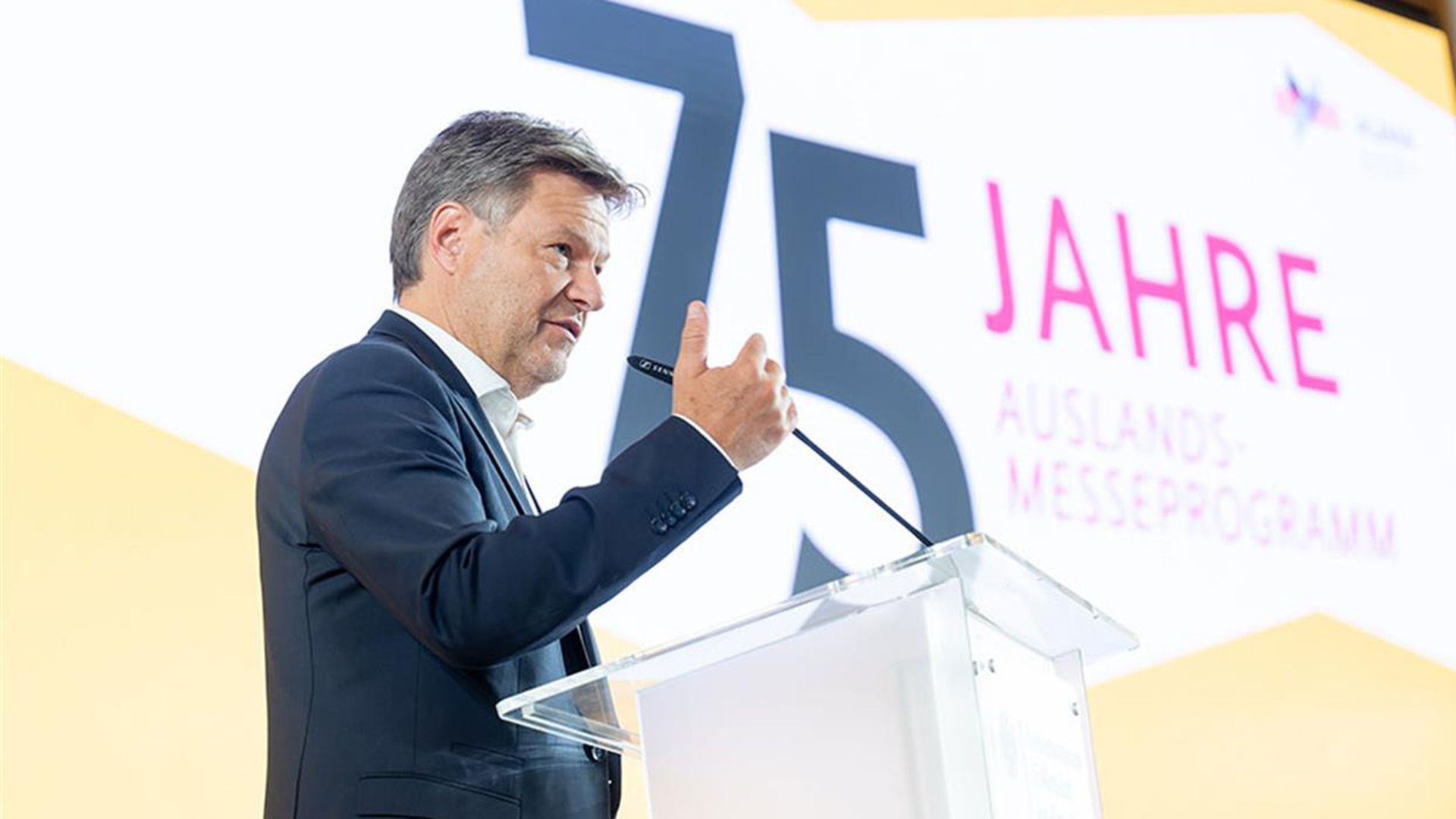
Prosperity, growth and economic success for all - that's what the international trade fair programme is all about, says Robert Habeck, Federal Minister for Economic Affairs and Climate Action. Photo: Christian Kruppa
The AMP is the oldest funding programme of the Ministry of Economic Affairs and the Federal Government. Participation is open to companies based in the Federal Republic of Germany and their foreign branches and agencies with exhibits manufactured in the Federal Republic of Germany or by German branches abroad or under German licence. Participation in trade fairs organised by the Federal Republic of Germany abroad mainly takes the form of joint company stands, which are connected to the respective information stands of the Federal Government. This provides exhibitors with cost-effective participation opportunities, organisational advantages and numerous advertising and representation opportunities. 85 per cent of small and medium-sized enterprises (SMEs) and start-ups take advantage of the offer to boost and increase their business abroad. It offers them more reach, more orders, more exports, more turnover - at relatively favourable participation costs. A wide range of trade fairs is covered. The spectrum ranges from specialised trade fairs in highly developed countries to universal trade fairs in developing countries, including trade fairs for automation, energy, electrical engineering and electronics, medical technology, furniture and toys, agricultural and agricultural technology, construction technology, mechanical engineering, IT and telecommunications.
SMEs take advantage of the offer
In its founding year, the foreign trade fair programme was funded with one million Deutschmarks. At the start, five countries were selected by the then Ministry of Economics, and five companies participated in the programme. Its launch created the basis for Germany as an export nation: Germany is the world's third largest exporter of goods behind China and the USA. This means that the German export industry is of central importance for the country's economy. A good quarter of jobs depend directly or indirectly on exports, and more than half in the manufacturing sector (source: BMWK, Facts on German foreign trade, 2023). Sweden, Turkey, the USA, Canada and Pakistan form the basis for this success. They were the first five countries in which the Federal Republic invested in trade fair appearances in 1949. The success is convincing right from the start, ten years later the budget already amounts to 10 million German marks, 45 participations can be organised. In 1971, the programme included 100 trade fairs for the first time, and in the 1990s the foreign trade fair budget climbed from DM 39 million (1990) to DM 65 million in 1995. 75 years after its foundation, the programme included up to 250 trade fair participations per year at its peak, for which the federal government provided more than 45 million euros in 2022. Up to 5,000 exhibiting companies take part in the programme every year.
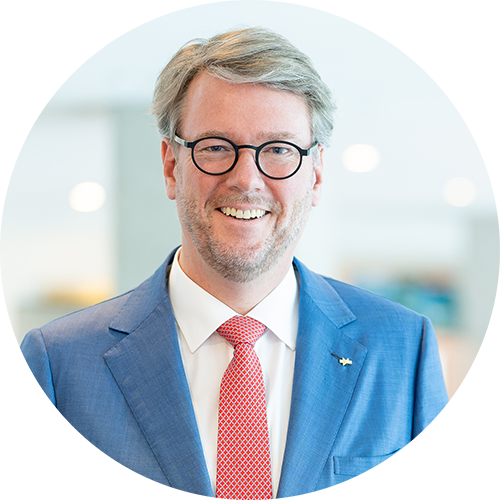
Photo: Christian Kruppa
"For 75 years, the proven foreign trade fair programme has been the most successful and efficient support for small and medium-sized German companies on their way to foreign markets."
Philip Harting, Auma Chairman
In the anniversary year 2024, the Budget Committee of the German Bundestag has set the programme in the budget of the Federal Ministry of Economics at around 44 million euros after recent drastic cuts - and is thus building on the level before the coronavirus pandemic. This year's planned programme includes over 200 trade fair participations in 40 countries. The Association of the German Trade Fair Industry (Auma) has been involved right from the start of AMP. The Association of the German Trade Fair Industry is responsible for coordinating Germany's participation in trade fairs abroad. Auma Chairman Philip Harting thanked "all those who have contributed to the success of the programme for decades" in an interview with Federal Minister of Economics Robert Habeck. For him, the foreign trade fair programme "stands for successful cooperation between politics, business and associations". Harting: "Exhibiting companies gain special attention at trade fairs worldwide at the joint stands under the umbrella brand 'Made in Germany'." The growing number of German Pavilions is proof of the programme's success. The programme is a door opener for German SMEs in exciting markets." 140 joint participations alone took place in the first half of 2024.
German Pavilions
The so-called German Pavilions form the core of the foreign trade fair programme, the joint stands of the Federal Republic of Germany. The most common form of a German Pavilion is the "joint company participation", as individual company participations in foreign trade fairs are not supported by the foreign trade fair programme. In the case of joint company participations, individual company stands are grouped together. The umbrella brand "Made in Germany" forms the visual bracket. The aim is to achieve the most coherent possible presentation of products from Germany through the labelling.
And: the economy knows where to go: it follows the markets and the AMP follows suit. A look at the annals of the foreign trade fair programme also shows this. In 1975, the German industrial exhibition Technogerma was held for the first time in Beijing, followed by technical exhibitions in Tokyo (1984), Delhi (1988), Seoul (1991), Mexico (1994) and Jakarta (1999). In 1991, for the first time, there were more joint participations in Asia than in America. A trend that was to continue for a long time. Today, the focus is on the USA, China, the United Arab Emirates and India. The German economy is looking for new channels and is diversifying. Greater diversification of Germany's trade and supply relationships is a key objective of the German government's foreign trade policy. The coronavirus pandemic has already highlighted the fragility of global supply chains and Germany's dependence on individual trading partners. Russia's war of aggression against Ukraine, which violates international law, and the threat to Germany's energy supply security in the meantime have ruthlessly revealed that strong economic dependencies on autocratically governed countries can harbour considerable risks for Germany's geopolitical and economic ability to act in the event of a conflict, according to the BMWK.
Fundament der Exportnation
In this respect, AMP is diversification in action. Extending the service programme to new products and new markets is the core of its brand. It is a success story and has actively contributed to many other success stories during its existence. "If the AMP didn't exist, it would have to be invented," said Robert Habeck, Federal Minister for Economic Affairs and Climate Protection, in his tribute. "It was hoped that the programme would develop brilliantly, but it was not expected so quickly." Habeck underlines the importance of the oldest funding programme: "Since its inception, it has enabled over 200,000 German companies to enter foreign markets and forms the foundation for Germany as an export nation, for prosperity and security over a very long period of time. The money comes back in many ways, as the programme has made a significant contribution to promoting international trade and strengthening the competitiveness of German companies on global markets. On behalf of the Federal Ministry for Economic Affairs and Climate (BMWK), PwC took a closer look at the whole programme in 2017. The auditors' findings: for every million euros invested, around 216 million euros in additional export revenue can be generated. This means that a current annual budget of 43 million euros generates almost ten billion euros in export revenue. This was another reason for founding the company: to support German companies in their first trade fair appearances abroad and thus secure jobs, added value and tax revenues in Germany.
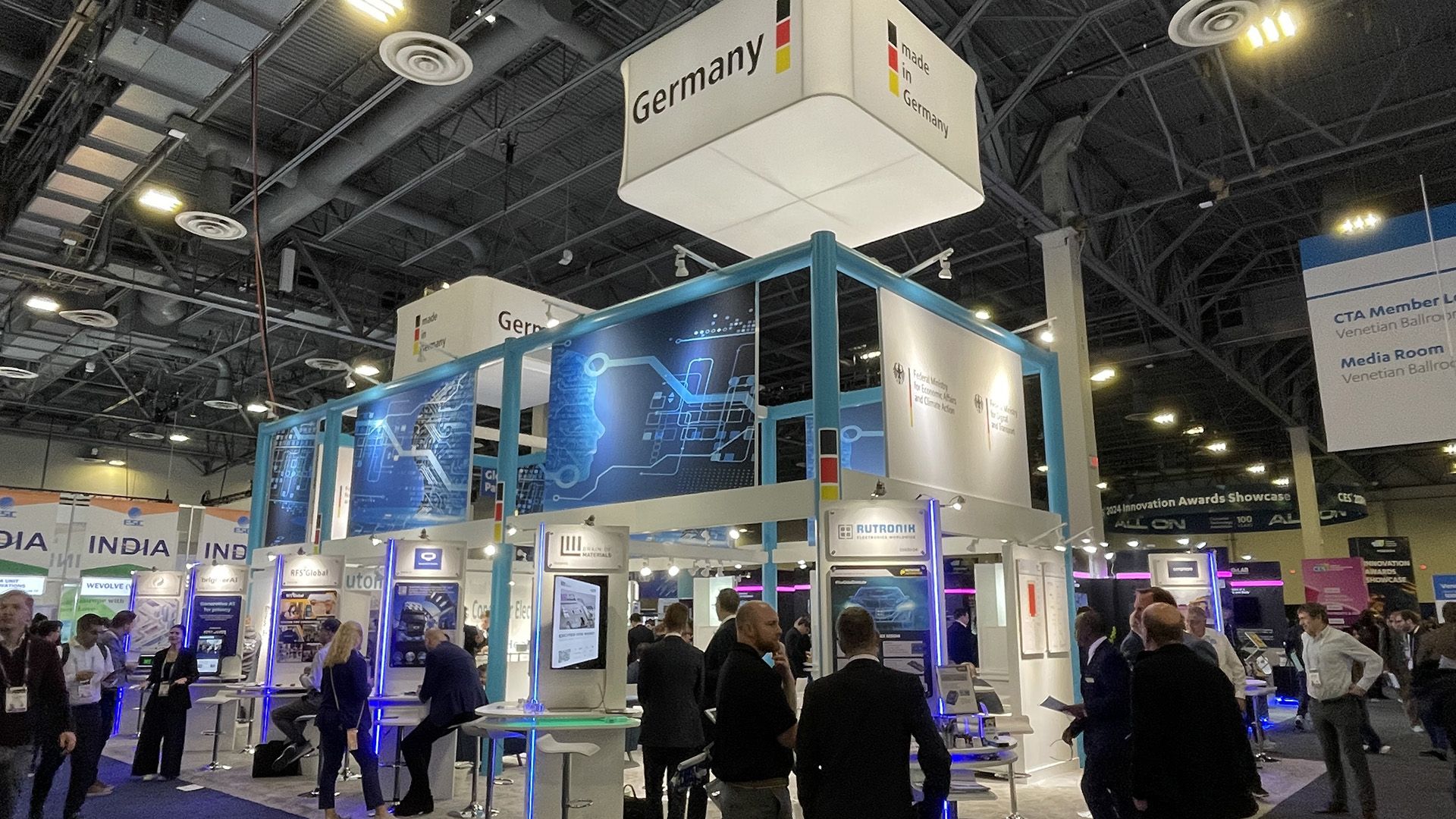
Germany at the CES in Las Vegas: The AMP forms the foundation for Germany as an export nation. Photo: Angela Mans
The budget for the foreign trade fair programme is provided by the Bundestag each year. The German Association of the Trade Fair Industry (Auma) coordinates the decision as to which trade fairs are included in the foreign trade fair programme of the Federal Ministry of Economics and Climate Protection (BMWK) and the Federal Ministry of Food and Agriculture (BMEL) from the perspective of the industry. Other trade fairs are included by the responsible ministries for political reasons. The responsible ministries commission "implementation companies" with the preparation and realisation of foreign trade fair participations. They are the contact partners for the exhibiting companies.
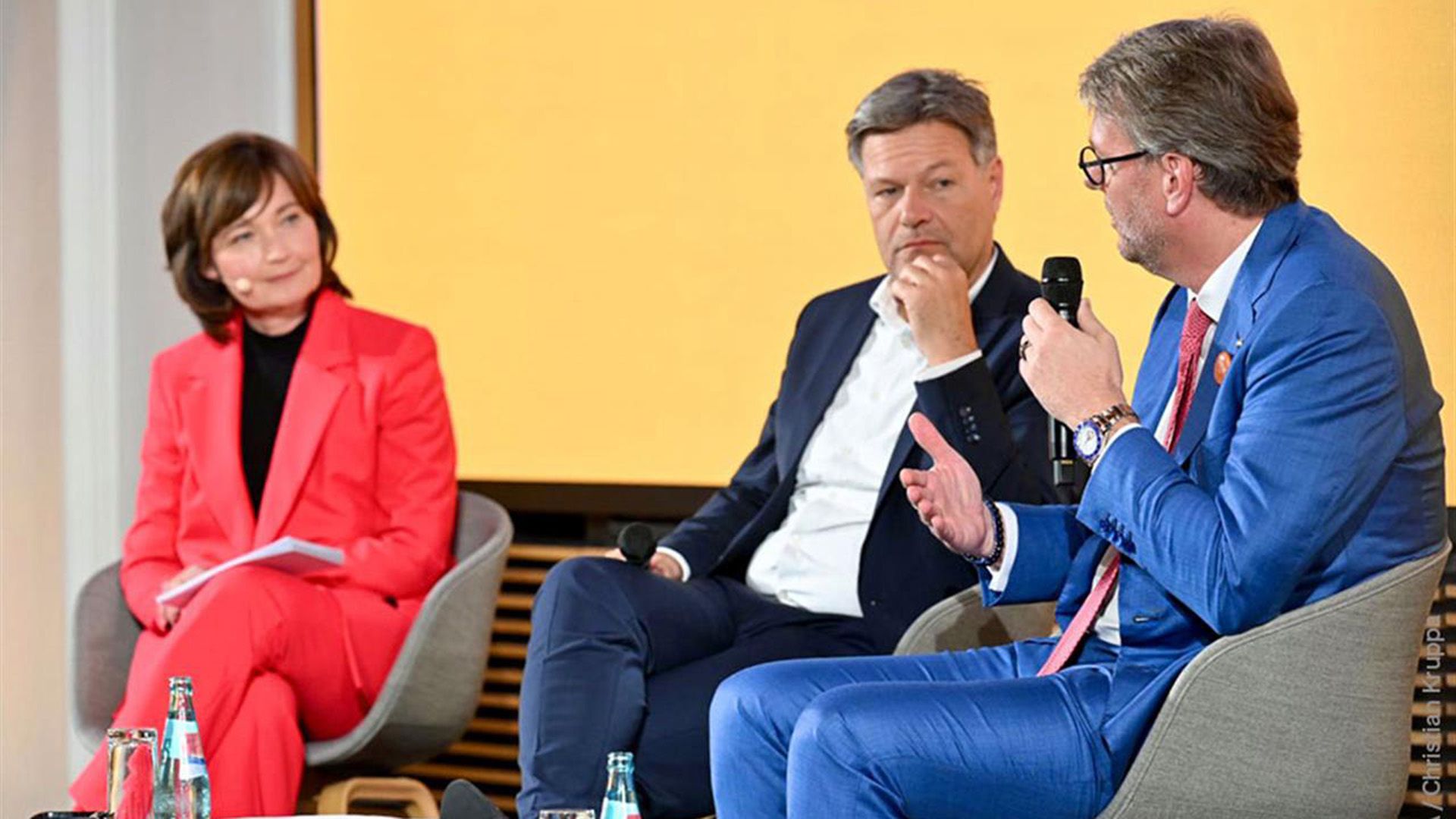
Delighted with the success of the Ministry of Economic Affairs' oldest funding programme: presenter Monika Jones, Federal Minister for Economic Affairs Robert Habeck and Auma Chairman Philip Harting. Photo: Christian Kruppa
The AMP remains an indicator: Latin America is increasingly coming into focus, and German industry's interest in it is growing, according to the foreign trade fair programme for 2025. Compared to the current year, the federal government's strongest funding programme for the first appearances of small and medium-sized German companies abroad will include 20 trade fairs in Latin America from 2025. That is twice as many as at present. The proportion of trade fair support in the EU has increased from the current 18 to two dozen participations. Trade fair opportunities in the Middle East will increase from 23 to 28 participations today, while the number in Africa will remain constant at 22 appearances. In total, small and medium-sized German companies will be supported by the Federal Ministry for Economic Affairs and Energy at 230 trade fairs in almost 50 countries in the coming year. The countries of South East and Central Asia remain at the top of the list with more than 80 trade fair sponsorships. The USA will again be the most important country with more than 30 participations. China and the United Arab Emirates follow with 24 and 23 joint stands respectively, India with 15 and Thailand with eight trade fairs. Auma Chairman Philip Harting puts it in a nutshell: "The personal approach creates additional trust. Trade fairs abroad are a particularly effective export marketing tool."
New for our international readers:
For the first time, we are offering an English version of our magazine in addition to the German edition. The translation was made with the help of AI and is currently in the test phase. We’d love to hear your feedback on this new service!